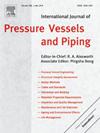滑动压痕管材的应力集中和疲劳寿命研究
IF 3.5
2区 工程技术
Q2 ENGINEERING, MECHANICAL
International Journal of Pressure Vessels and Piping
Pub Date : 2024-11-13
DOI:10.1016/j.ijpvp.2024.105360
引用次数: 0
摘要
滑移对油管外壁造成的压痕是造成应力集中的重要因素,进而导致油管串疲劳失效。通过分析滑移与油管之间的相互作用,建立了预测滑移-油管相互作用和滑移压溃载荷的数学模型,并考虑了外压、内压和轴向力。在此基础上,研究了滑移压溃载荷的影响因素和影响规律,并在考虑不同横向载荷系数和设计系数的情况下,研究了管材的三维屈服面和三轴应力椭圆。为了准确预测油管在滑移压痕作用下的疲劳寿命,建立了两个模型:一个是疲劳寿命预测模型,另一个是油管串振动模型。为了定量评估滑移压痕产生的应力集中,建立了具有滑移压痕的油管有限元模型。有限元分析表明,滑移压痕附近存在明显的应力集中和不均匀现象,其严重程度随着压痕深度的增加而加剧。评估疲劳寿命的第一步是在不同应力水平下对管材进行疲劳寿命测试。随后进行案例研究,评估井口压力和轴向应力的变化。疲劳寿命分析表明,疲劳寿命对应力振幅和滑移压痕深度的变化非常敏感。交变应力幅值和滑移压痕深度的增加会导致疲劳寿命显著缩短。本研究采用的方法以及由此得出的结论为预测和管理受滑移压痕影响的管道中的应力集中和疲劳耐久性提供了强大的理论框架和坚实的实践基础。本文章由计算机程序翻译,如有差异,请以英文原文为准。
Study on stress concentration and fatigue life of tubing with slip indentation
The indentation caused by slip on the outer wall of tubing is a significant contributor to stress concentration and, consequently, fatigue failure in the tubing string. Through an analysis of the interaction between slips and tubing, a mathematical model to predict slip-tubing interaction and slip crushing load is formulated, accounting for external pressure, internal pressure, and axial forces. On this basis, the influence factors and influence rules of slip crushing load are studied, and three-dimensional yield surface and tri-axial stress ellipse of tubing are investigated, considering different transverse load factors and design factors. To accurately forecast the fatigue life of tubing subjected to slip indentation, two models are established: one for fatigue life prediction and the other for tubing string vibration. In order to quantitatively assess the stress concentration arising from slip indentation, a finite element model of tubing featuring slip indentation is established. Finite element analysis reveals that stress concentration and non-uniformity are evident in the vicinity of slip indentation, with their severity intensifying as the indentation depth grows. The initial step in assessing fatigue life involves fatigue life tests on tubing material subjected to varying stress levels. Subsequently, a case study is conducted and the variations of wellhead pressure and axial stress are evaluated. Fatigue life analysis reveals that the fatigue life is notably sensitive to variations in stress amplitude and slip indentation depth. An increase in the magnitude of alternating stress and the depth of slip indentation will result in a significant reduction in the fatigue lifespan. The methodologies employed in this research, along with the resulting findings, offer a robust theoretical framework and a solid practical basis for forecasting and managing stress concentration and fatigue durability in tubing affected by slip indentation.
求助全文
通过发布文献求助,成功后即可免费获取论文全文。
去求助
来源期刊
CiteScore
5.30
自引率
13.30%
发文量
208
审稿时长
17 months
期刊介绍:
Pressure vessel engineering technology is of importance in many branches of industry. This journal publishes the latest research results and related information on all its associated aspects, with particular emphasis on the structural integrity assessment, maintenance and life extension of pressurised process engineering plants.
The anticipated coverage of the International Journal of Pressure Vessels and Piping ranges from simple mass-produced pressure vessels to large custom-built vessels and tanks. Pressure vessels technology is a developing field, and contributions on the following topics will therefore be welcome:
• Pressure vessel engineering
• Structural integrity assessment
• Design methods
• Codes and standards
• Fabrication and welding
• Materials properties requirements
• Inspection and quality management
• Maintenance and life extension
• Ageing and environmental effects
• Life management
Of particular importance are papers covering aspects of significant practical application which could lead to major improvements in economy, reliability and useful life. While most accepted papers represent the results of original applied research, critical reviews of topical interest by world-leading experts will also appear from time to time.
International Journal of Pressure Vessels and Piping is indispensable reading for engineering professionals involved in the energy, petrochemicals, process plant, transport, aerospace and related industries; for manufacturers of pressure vessels and ancillary equipment; and for academics pursuing research in these areas.

 求助内容:
求助内容: 应助结果提醒方式:
应助结果提醒方式:


